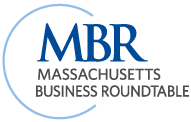Breaking Barriers to Build Black Wealth
By Mahesh Admankar, Civic Action Project Fellow, Massachusetts Business Roundtable and PhD scholar at University of Massachusetts Boston
The public health disparities exacerbated by the global COVID-19 pandemic and the murders of George Floyd, Breonna Taylor, and Ahmaud Arbery sparked the latest racial and social awakening in communities across the country and world. As communities—including employers—looked inward for creating change, a call to action was heard from the board room to the living room: break barriers that have historically promoted systemic and institutional racism in our society.
The Roundtable wholeheartedly believes in the value of listening and learning as incredible resources to help educate individuals and communities that are ready to be a part of this long overdue call to action. Leading up to Juneteenth, The Boston Globe convened a timely discussion with local experts focused on breaking barriers with the goal of building Black wealth among Black individuals and families in the US. Shirley Leung of The Boston Globe moderated the panel featuring Herby Duverné, CEO & Principal of Windwaker Group; Melissa James, President and CEO of The Tech Connection, Inc.; and Dania V. Francis, Assistant Professor of Economics at the University of Massachusetts Boston.
Over the course of an hour, experts explored both the challenges and strategies in building Black wealth in America as well as potential policies and approaches government, employers, and individuals may consider to build Black wealth in Massachusetts and across the country. In commemoration of Juneteenth and as the Roundtable continues to share resources with its members, below includes a snapshot of some examples shared by panelists for employers to consider for the advancement of Black employees as well as many marginalized populations within the workplace.
Incorporate Diversity, Equity, and Inclusion Among Core Principles within the Workplace: As companies pledge to improve diversity, equity, and inclusion, it is important for business leaders to foster a culture within the workplace that effectively delivers on these principles to create more equitable workplaces. Promoting diversity, equity, and inclusion must be combined with fostering a welcoming culture that emphasizes belonging for all employees especially people of color and other diverse populations.
Maintain Accountability to Create Systemic Change: Employers should evaluate its own practices and policies by creating checks and balances within their organizations as a strategy to eliminate discrimination within the workplace.
Consider Lived Experiences When Attracting Talent: While the resume and GPA may be traditional measures for reviewing candidates especially for entry-level and early career roles, it does not reflect the lived experiences or potential that may be valuable to an employer and teams within a company. Melissa James of The Tech Connection advised employers to consider qualities like perseverance and ambition, attributes that will not always be distinguished in a resume. When interviewing candidates, employers should incorporate questions to learn about the lived experiences and potential transferrable skills candidates can bring to a role. From learning English as a second language and challenges immigrants have overcome to individuals managing multiple jobs to make ends meet, strong candidates can demonstrate tenacity in overcoming personal and professional challenges and experiences.
Keep People at the Center: Herby Duverné of the Windwaker Group called for making products accessible and affordable. While employers need to consider profits and the bottom line, keeping people at the center of this work can help in delivering greater accessibility and affordability for the constituents and consumers companies aim to serve.
Collaborate with Minority-Serving Institutions: Herby Duverné described how his company collaborates with Cambridge College, which is one of approximately 30 Minority-Serving Institutions in Massachusetts; UMass Boston and Benjamin Franklin Institute of Technology are examples of other Minority-Serving Institutions in Massachusetts. There are several ways employers can foster partnerships with these institutions such as supporting the development of academic curricula, a strategy that will help bridge the gap between the skills employers need and rising talent.
Expand Access to Different Forms of Capital: From financial capital to social capital, increasing access for Black employees and jobseekers is extremely valuable in gaining wealth and networking opportunities. This may be a relevant tool for employers to consider within their workplace as well as for leaders within the workplace who have their own networks and resources others can benefit from through greater awareness, connections, mentorship, and more.
Educate the Workforce. As employers consider internal practices, these efforts should include strategies to communicate to its workforce on goals, opportunity, and accountability for employees and the company to commit to anti-racist and anti-discriminatory practices including checks and balances within the workplace.
What practices have you implemented or are implementing within the workplace that increases access and opportunity for Black employees and employees of color? We want to hear from you! Share best practices by emailing: ljones@maroundtable.com and staff@maroundtable.com.
RECENT POSTS
- No Borders: Climate Change, A Call to Action for All
- Celebrating Diversity
- A Talent Agenda to Drive Massachusetts Competitiveness
- Taking Aim at the State’s Competitiveness
- Bentley and Roundtable Gather Executives To Discuss How Business Impacts Society
- Quarterly Policy Roundup: Q2 2024
- What We Learned on Our Trip to D.C.
- Conversations with Business Leaders: Navigating the Challenges Impacting Growth in Massachusetts
- Quarterly Policy Roundup: Q1 2024
- Black History Month: Reflections from Roundtable Staff
